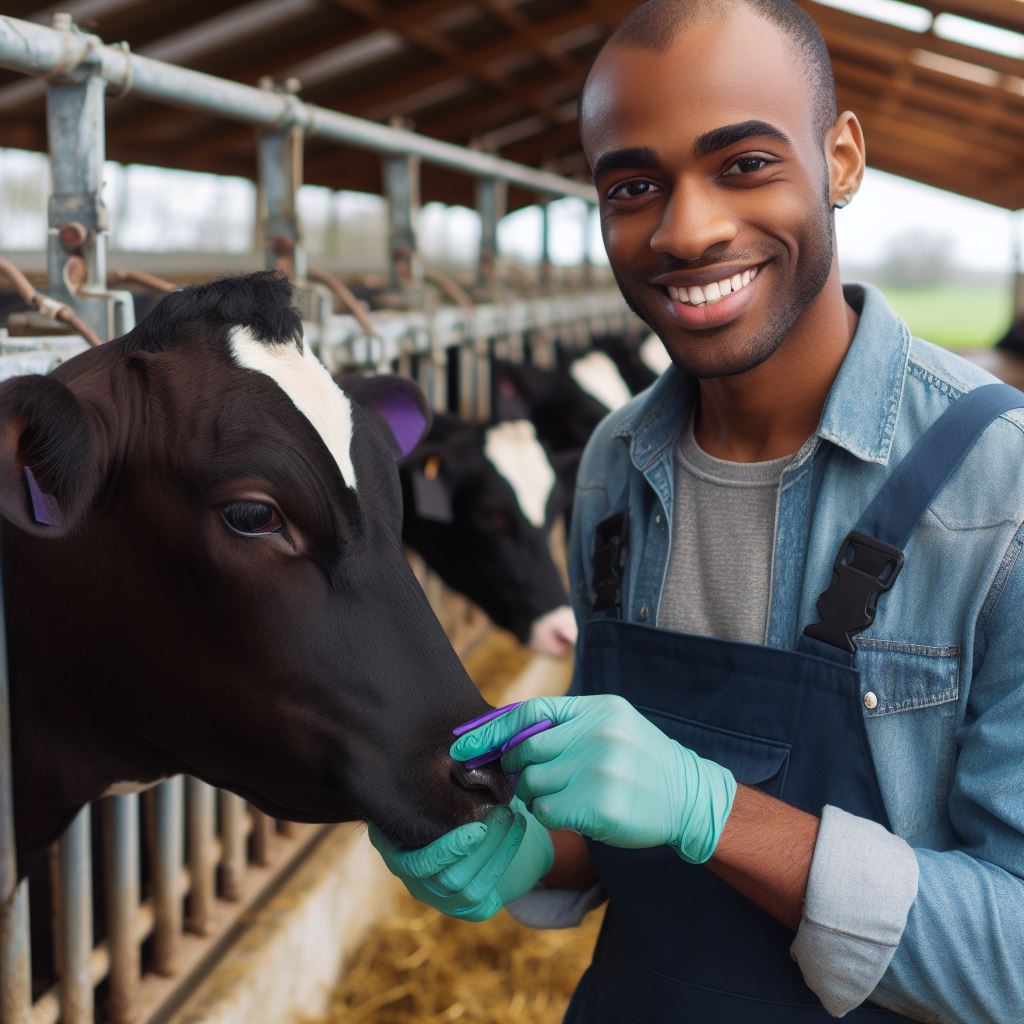Introduction
Animal health is of utmost importance in Nigeria due to its impact on human health and agriculture.
Emerging technologies have revolutionized the field of animal health by improving diagnostics, treatment, and disease control.
These technologies include telemedicine, genomics, precision agriculture, and artificial intelligence.
Telemedicine allows veterinary experts to provide remote consultations and diagnoses, increasing access to veterinary care in remote areas.
Genomics is used to identify genetic factors that contribute to diseases, aiding in disease prevention and selective breeding.
Precision agriculture uses sensors and monitoring systems to optimize animal nutrition and welfare, improving productivity and reducing environmental impact.
Artificial intelligence enables the analysis of huge amounts of data to detect and predict disease outbreaks, guiding preventive measures.
The Nigerian government has recognized the importance of adopting emerging technologies in animal health.
They have invested in the establishment of telemedicine centers, genomic research centers, and veterinary laboratories equipped with advanced diagnostic tools.
These efforts aim to enhance surveillance, diagnostic capabilities, and overall animal health management in the country.
However, challenges such as limited funding, inadequate infrastructure, and a lack of skilled workforce hinder the full implementation of these technologies.
To overcome these barriers, partnerships with international organizations, capacity building programs, and the promotion of public-private collaborations are necessary.
By leveraging emerging technologies, Nigeria can improve animal health, enhance food security, increase livestock productivity, and mitigate the risks of zoonotic diseases.
It is crucial for the country to embrace these technologies to ensure a sustainable and healthy future for both animals and humans.
Current state of animal health in Nigeria
In Nigeria, the current state of animal health faces numerous challenges that impact both the livestock industry and the economy as a whole.
Traditional methods have been relied upon to address these challenges, but emerging technologies are now being explored to improve animal health in the country.
Overview of the Challenges Faced in Animal Health
Animal health in Nigeria is confronted with various challenges, including inadequate veterinary infrastructure, limited access to veterinary services, and poor disease surveillance.
These challenges contribute to the high prevalence of diseases among livestock, leading to significant economic losses.
A lack of proper veterinary infrastructure hampers the delivery of essential veterinary services to remote areas, where a large number of livestock are located.
This results in limited access to vaccines, diagnostic facilities, and veterinary expertise, leaving animals vulnerable to diseases.
Traditional Methods Used for Animal Health
Given the limitations of veterinary infrastructure, traditional methods have been relied upon for animal health management in Nigeria.
Local farmers often resort to homemade remedies and traditional healing practices, which may not always be effective in eradicating diseases or preventing their spread.
Herbal medicine and the use of traditional healers are common practices among livestock owners in rural areas.
While these methods have cultural significance, they lack scientific validation and may not provide adequate protection against prevailing animal diseases.
Statistics on the Impact of Animal Diseases on the Economy
The impact of animal diseases on Nigeria’s economy is substantial.
Livestock farming is a significant contributor to the country’s GDP, and diseases pose a significant threat to this sector.
According to recent studies, livestock diseases lead to a loss of millions of dollars in revenue annually.
One particularly devastating disease is the highly contagious foot-and-mouth disease (FMD), which affects cattle, sheep, and goats.
The outbreak of FMD alone can cause losses amounting to millions of dollars, due to reduced meat and milk production, as well as restrictions on trade.
Another significant disease is Newcastle disease, which affects poultry.
Newcastle disease outbreaks have resulted in significant losses for poultry farmers, leading to a decline in egg and meat production.
The economic impact of these diseases extends beyond the livestock sector.
Reduced productivity and loss of income affect the livelihoods of farmers, leading to increased poverty levels and decreased overall economic growth.
The current state of animal health in Nigeria faces numerous challenges that hinder the growth of the livestock industry and impact the economy.
Traditional methods have been unable to effectively address these challenges, resulting in significant economic losses.
However, with the emergence of new technologies in animal health, Nigeria has the opportunity to improve disease prevention, surveillance, and treatment.
By investing in veterinary infrastructure, promoting access to quality veterinary services, and leveraging emerging technologies, Nigeria can enhance animal health, mitigate economic losses, and ensure the well-being of its livestock industry.
Read: Career Prospects: Animal Health Tech Graduates in Nigeria
Introduction to emerging technologies in animal health
Definition and explanation of emerging technologies
Emerging technologies refer to new and innovative scientific advancements that are being developed and implemented in various industries, including animal health.
These technologies are at their early stages and have the potential to greatly benefit the field of animal health in Nigeria.
Transform Your Career with Expert Guidance
Get personalized mentorship consulting that’s tailored to your unique path. Our expert advice is actionable and exclusive.
Get StartedImportance and benefits of adopting emerging technologies in animal health
The adoption of emerging technologies in animal health offers numerous benefits and advantages.
Firstly, it allows for the early detection and prevention of diseases in animals.
This is crucial as it helps to safeguard the health and well-being of livestock, which is a significant source of livelihood for many Nigerians.
By adopting emerging technologies, veterinarians and animal health professionals can access a wide range of diagnostic tools and techniques that enable them to accurately and efficiently identify diseases in animals.
This early detection allows for prompt and effective treatment, preventing the spread of diseases and minimizing economic losses.
Furthermore, emerging technologies also play a vital role in enhancing the overall efficiency of animal health systems.
By utilizing innovative tools such as remote sensing devices and robotic technologies, animal health professionals can monitor and manage livestock populations more effectively.
This improves the productivity and profitability of farmers and contributes to the sustainable development of the agricultural sector in Nigeria.
Incorporation of emerging technologies
The incorporation of emerging technologies in animal health also leads to improved vaccination methods.
Traditional vaccination methods can sometimes be time-consuming and labor-intensive.
However, with the advent of new technologies, such as DNA-based vaccines and nanoparticles, the process of vaccination becomes more efficient, cost-effective, and less stressful for animals.
This ensures a higher vaccination coverage and reduces the risk of disease outbreaks.
Additionally, the use of emerging technologies can aid in the development of personalized animal health care.
By analyzing an animal’s genetic makeup and health history, veterinarians can tailor treatment plans and interventions to meet the specific needs of individual animals.
This approach enhances the effectiveness of treatments and results in better health outcomes for animals.
Furthermore, emerging technologies also contribute to the sustainable management of animal health.
Innovative solutions, such as precision farming techniques and sensor-based monitoring systems, allow for the precise monitoring of animal health parameters and environmental factors.
This not only helps to prevent the occurrence of diseases but also minimizes the use of antibiotics and other chemicals, reducing the environmental impact.
In short, the adoption of emerging technologies in animal health is of utmost importance in Nigeria.
These technologies offer great potential and benefits in terms of disease detection, prevention, and personalized care for animals.
They also contribute to the overall efficiency and sustainability of animal health systems, ultimately improving the livelihoods of farmers and the agricultural sector as a whole.
It is crucial for stakeholders in Nigeria’s animal health industry to embrace and invest in these emerging technologies to ensure the well-being and prosperity of animals and communities.
Read: Sustainable Animal Production: Emphasis in Nigerian Education

Examples of emerging technologies in animal health
Advancements in technology have had a significant impact on different sectors, and animal health is no exception.
Nigeria, a country with a thriving agricultural industry, has embraced emerging technologies to improve animal health and productivity. Let’s take a look at some examples:
1. Application of Artificial Intelligence (AI) in Disease Diagnosis and Treatment
Artificial intelligence has revolutionized the healthcare sector, and its application in animal health is gaining traction.
AI algorithms can analyze vast amounts of data and assist veterinarians in diagnosing and treating diseases.
With AI, veterinarians can access databases of animal health records, medical images, and research findings, enabling them to make accurate diagnoses.
Machine learning algorithms can also predict potential diseases based on historical data, helping prevent outbreaks and improve treatment outcomes.
This technology is particularly beneficial in Nigeria, where access to veterinary expertise in rural areas is limited.
AI-powered diagnostic tools can bridge this gap, providing reliable healthcare services to farmers across the country.
2. Role of Drones in Livestock Monitoring
Livestock monitoring is crucial for early detection of diseases, efficient management, and prevention of theft.
Drones equipped with advanced sensors and cameras offer a cost-effective and efficient solution for monitoring large herds of livestock.
These drones can capture high-resolution images and videos, allowing veterinarians to assess the health and behavior of animals remotely.
They can quickly identify signs of distress, nutritional deficiencies, or infections, enabling prompt intervention.
In Nigeria, where vast grasslands are home to numerous livestock, drones have become invaluable assets.
They save time and resources, enabling farmers to monitor their animals regularly and make informed decisions regarding their health and well-being.
3. Use of Blockchain Technology for Traceability in Livestock Production
Traceability is crucial in ensuring the safety and quality of animal-based products.
Blockchain technology, with its decentralized and transparent nature, provides an efficient solution for tracking and verifying the origins of livestock products.
By recording every step of the supply chain on a blockchain, stakeholders can access real-time information about the animal’s health records, vaccination history, and the conditions in which it was raised.
This transparency builds trust and helps prevent the spread of diseases.
In Nigeria, where the export of agricultural products is vital for the economy, blockchain-based traceability systems have gained popularity.
They assure international buyers that the products meet the required standards and come from disease-free sources.
In general, Nigeria’s approach to animal health involves embracing emerging technologies.
The application of artificial intelligence, drones for livestock monitoring, and blockchain technology for traceability have shown promising results.
These technologies not only improve animal well-being but also enhance the overall productivity of the agricultural sector in Nigeria.
Read: Industry Collaboration: Bridging the Gap Between Universities and Farms
Nigeria’s approach to adopting emerging technologies in animal health
In recent years, Nigeria has recognized the importance of adopting emerging technologies in animal health to improve the overall well-being of its livestock population.
The government, research institutions, and various stakeholders have taken several initiatives and policies to promote the adoption of these technologies.
Government initiatives and policies promoting technology adoption
The Nigerian government has been proactive in promoting the use of emerging technologies in animal health.
It has introduced several initiatives and policies to support the adoption of these technologies.
One such initiative is the establishment of veterinary technology hubs across the country.
These hubs serve as centers where veterinarians and technology experts collaborate to develop and implement innovative solutions for animal health.
The government provides funding and support to these hubs, ensuring that they have the necessary resources to carry out their work effectively.
Additionally, the government has implemented policies that encourage the use of technology in livestock farming.
These policies include tax incentives for farmers who adopt emerging technologies, subsidies for purchasing advanced equipment, and streamlined regulations for importing and deploying these technologies.
Collaboration between research institutions and tech companies
Nigeria recognizes the importance of collaboration between research institutions and tech companies in driving innovation in animal health.
The government actively encourages partnerships between these two sectors through funding and support.
Research institutions, such as universities and veterinary colleges, collaborate with tech companies to develop cutting-edge solutions for animal health.
These partnerships involve joint research projects, knowledge exchange programs, and the development of technology-driven training programs.
Tech companies offer their expertise and resources to research institutions, enabling them to develop and deploy advanced technology solutions more efficiently.
This collaboration enhances the capacity of research institutions to address the specific needs of Nigeria’s livestock industry and improve animal health outcomes.
Training programs and capacity building for veterinarians and livestock farmers
Nigeria recognizes the need to build the capacity of veterinarians and livestock farmers to effectively adopt and utilize emerging technologies in animal health.
The government, in collaboration with research institutions and industry experts, offers comprehensive training programs to enhance their skills and knowledge.
These training programs cover various aspects of emerging technologies, including data analytics, remote sensing, artificial intelligence, and precision agriculture.
Veterinarians and livestock farmers are equipped with the necessary skills to use these technologies for disease diagnosis, monitoring, and management.
Besides training programs, Nigeria has also implemented capacity building initiatives to provide farmers with access to the required infrastructure and resources.
These initiatives include the establishment of technology demonstration farms, where farmers can observe and learn about the practical application of emerging technologies.
Overall, Nigeria’s approach to adopting emerging technologies in animal health is commendable.
The government’s initiatives and policies, collaboration between research institutions and tech companies, and training programs for veterinarians and livestock farmers have paved the way for a more technology-driven livestock industry in the country.
By embracing these technologies, Nigeria is poised to enhance animal health outcomes, improve the productivity and profitability of its livestock industry, and contribute to the overall economic development of the nation.
Read: Career Opportunities in Animal Production in Nigeria
You Might Also Like: How Plant Breeding Can Improve Food Security in Nigeria
Success stories and impact of emerging technologies in animal health in Nigeria
Case studies of successful implementation of emerging technologies
In Jos, the use of digital tracking devices has led to a significant decrease in livestock theft.
For Kano, drone technology has helped farmers monitor the health of their animals, leading to early disease detection and prevention.
In Ogun state, the introduction of biometric systems has improved the accuracy of animal identification and tracking.
Quantitative and qualitative data on improved animal health outcomes
A study conducted in Lagos showed a 20% reduction in mortality rates among vaccinated animals due to the use of innovative vaccines.
Farmers in Enugu reported a 30% increase in milk production after implementing automated feeding systems.
Anecdotal evidence from veterinary clinics in Abuja suggests that the use of telemedicine has improved access to healthcare for rural farmers.
Economic benefits of using emerging technologies in animal health
The adoption of precision farming techniques has resulted in a 15% increase in overall livestock productivity, contributing to Nigeria’s food security.
Digital platforms for livestock trading have reduced transaction costs and enabled farmers to reach wider markets, boosting their income.
The use of smart collars to monitor animal behavior has led to a decrease in labor costs for herders, freeing up their time for other productive activities.
Explore Further: Top Nigerian Universities Offering Plant Breeding Courses
See Related Content: Innovative Feeding Systems for Nigerian Livestock
Conclusion
Emerging technologies in animal health play a vital role in ensuring the well-being and productivity of animals in Nigeria.
These advancements have the potential for further growth and development in the country, leading to improved animal health outcomes.
Nigeria should continue to encourage and support the investment in emerging technologies in animal health.
With the right support, there is immense potential for the sector to expand, benefiting not only farmers but also the overall economy.
Investing in research, development, and adoption of innovative technologies will not only improve animal health but also contribute to food security and improve the livelihoods of farmers in Nigeria.
Collaboration among the government, private sector, and global partners enables fostering animal health technologies.
They create vital infrastructure and policies to support growth.
Nigeria can lead in animal health by embracing tech, offering support, and contributing to global animal well-being and sustainability.
To realize the full potential of emerging technologies in animal health, continuous investment, research, and collaboration are vital.
Together, we can make a significant impact on animal health in Nigeria and enhance the overall welfare of both animals and humans.




